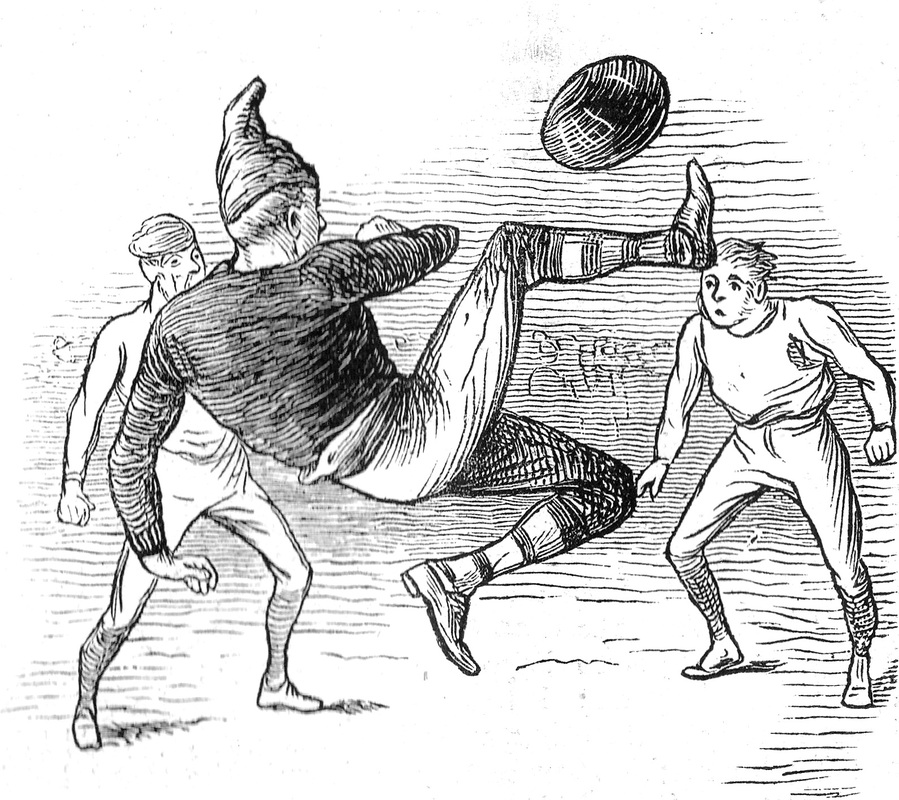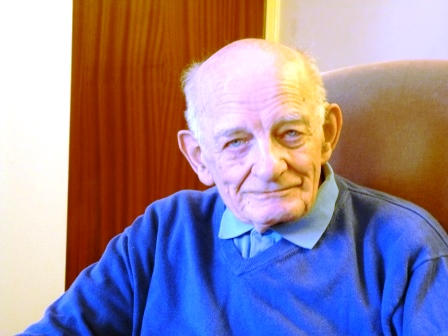Walter recalls going to tea as a boy at the Cambuslang home of his great uncle, Willie Mackinnon, Scotland's first centre-forward, who also lived past his 90th birthday. Among his other claims to fame, he performed the first recorded overhead kick (above) and played for Rangers in their first game.
A pensioner in Glasgow has a unique connection to the world’s first football international. 90-year-old Walter Fergusson can remember, as a boy, being taken to tea at his great uncle’s house – his relative being Willie Mackinnon, Scotland’s centre forward in 1872.
Walter is probably the last person alive who can say they met a player from the very first time Scotland’s football team took the field.
His great uncle was a Scotland star throughout the 1870s, making eight consecutive appearances against England and one against Wales, scoring five times in the process. He won three Scottish Cup finals with Queen’s Park, and even made a guest appearance for Rangers in their first match.
Mackinnon’s other claim to football fame is making the first recorded overhead kick, as described by a reporter at the 1872 international: Mackinnon, who is not tall, here made a very clever kick. The ball was on the bound higher than his head, when he leaped up and to the surprise of his opponent, who was waiting till the ball came over Mackinnon, kicked it well up the hill. The kick was much admired, and lustily applauded.
He may have been a football legend, but surprisingly the talk in the Mackinnon household in Cambuslang was much more likely to be about music. Walter recalled: “The last time I met Willie Mackinnon was when I was 15 or 16, towards the end of my schooldays, I was taken to tea. My father’s mother was Willie’s sister and we were quite a close family.
“Willie was an international class tenor. As a young man he auditioned for La Scala Opera in Milan and was invited over to join them. Nowadays the football is so good in Italy he probably would have gone, but then it meant leaving the family so he stayed at home. He also played the cello, and when I went to see him there was a cello propped up against the wall.”
Mackinnon’s fame as a singer actually eclipsed his football talent, and towards the end of his life in 1938 was elected an honorary vice president of the Glasgow Choral Union – no mean accolade, as it also went that year to the famous composer Ralph Vaughn Williams. Mackinnon had joined the Choral Union as a boy alto even before his football career got underway, and became a tenor soloist in 1882. When he died in 1942, aged 90, his obituary in the Glasgow Herald was headed ‘Veteran Glasgow Musician’, highlighting his prominent role with numerous city musical groups.
He was much in demand, and Walter added: “My father was in the choir at Pollokshields Church and once, when they put on a performance of the Messiah, Willie was invited to do the solo, which was fine. But then he carried on singing through the chorus and had to be reined in as he had such a powerful voice that nobody else could be heard.”
Walter became a lifelong supporter of Queen’s Park thanks to his great uncle’s fame. “I first went to Hampden because of Willie Mackinnon,” he said, and his early memories of football recall a bygone age: “Although Queen’s Park were amateur, they could still compete at the top level before the war because they signed bankers and architects who had a career and couldn’t turn professional. Some of them were a bit eccentric: I remember Desmond White (later a director of Celtic) brought all his climbing gear to Hampden, then after the match went off to the hills to do some mountaineering.”
He has a family anecdote about the pioneering days: “After the match on a Saturday, the Queen’s Park players would head to the nearest pub for their dinner and came out well stewed. Willie would stagger home to Cambuslang, but had to be in a fit state to walk all the way back to Glasgow Cathedral to sing in the choir on the Sunday morning.”
Longevity runs in the family, and Walter has surpassed even his great uncle’s age. Now, 140 years after the first international, this means it is still possible to hear a first-hand account of one of Scotland’s earliest football pioneers.


 RSS Feed
RSS Feed